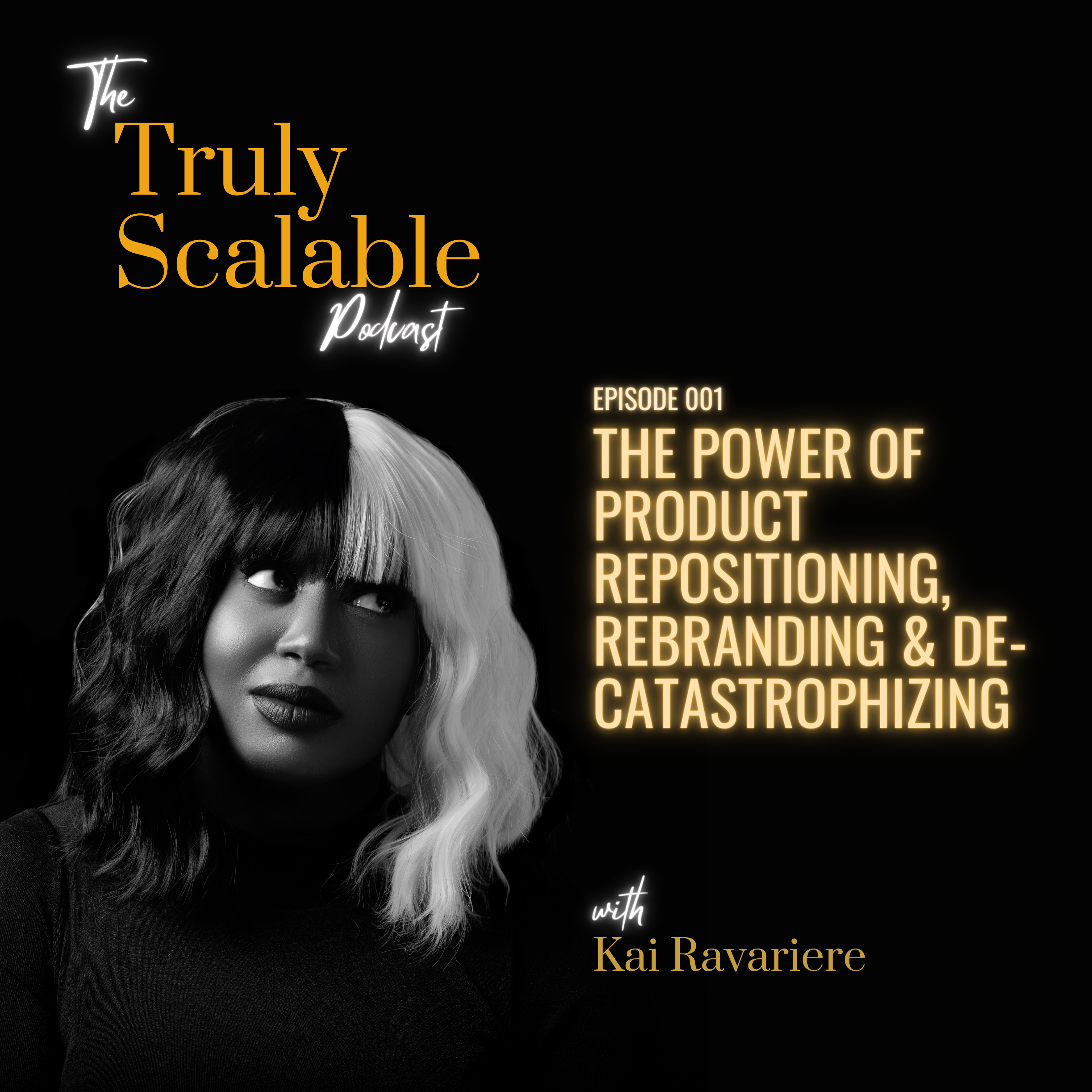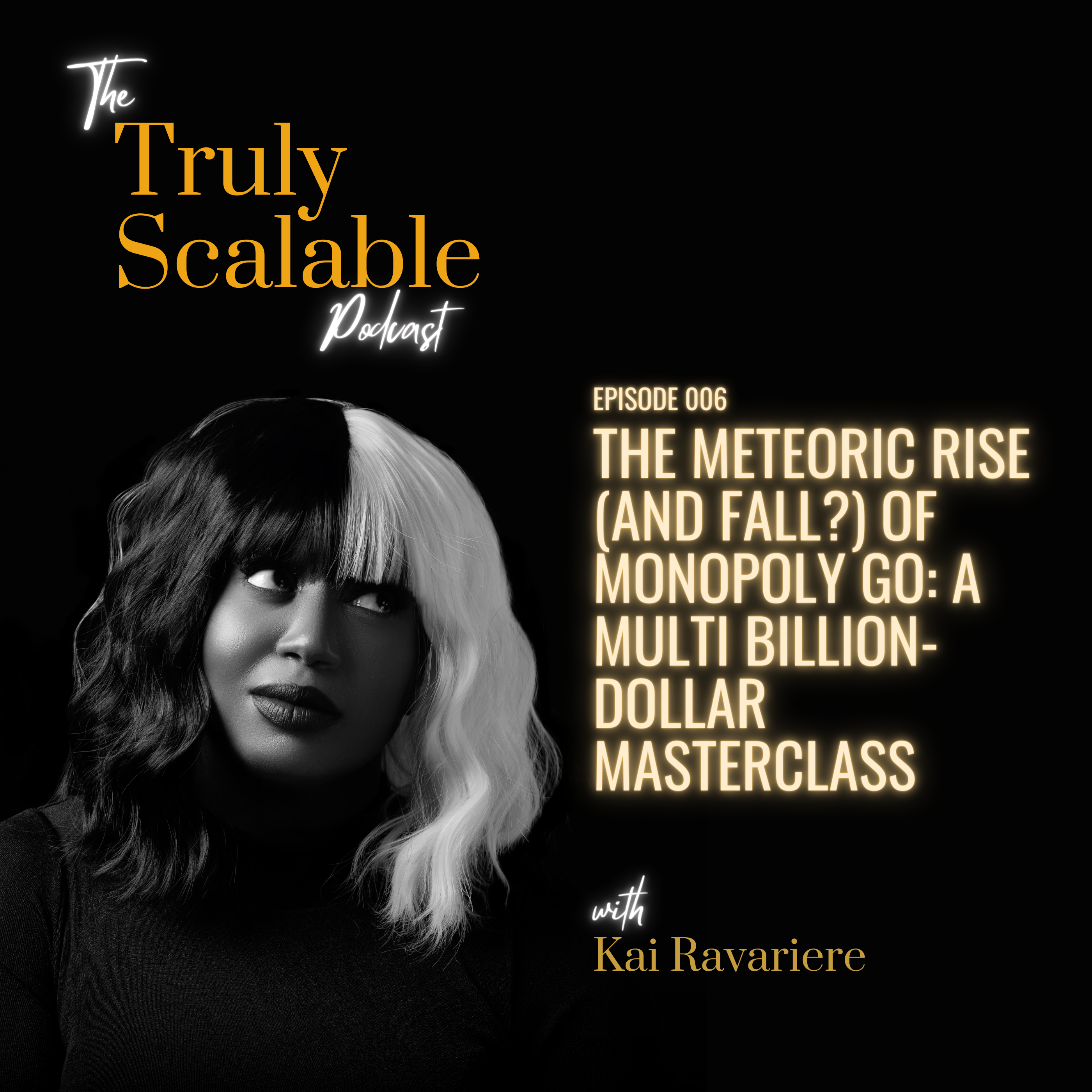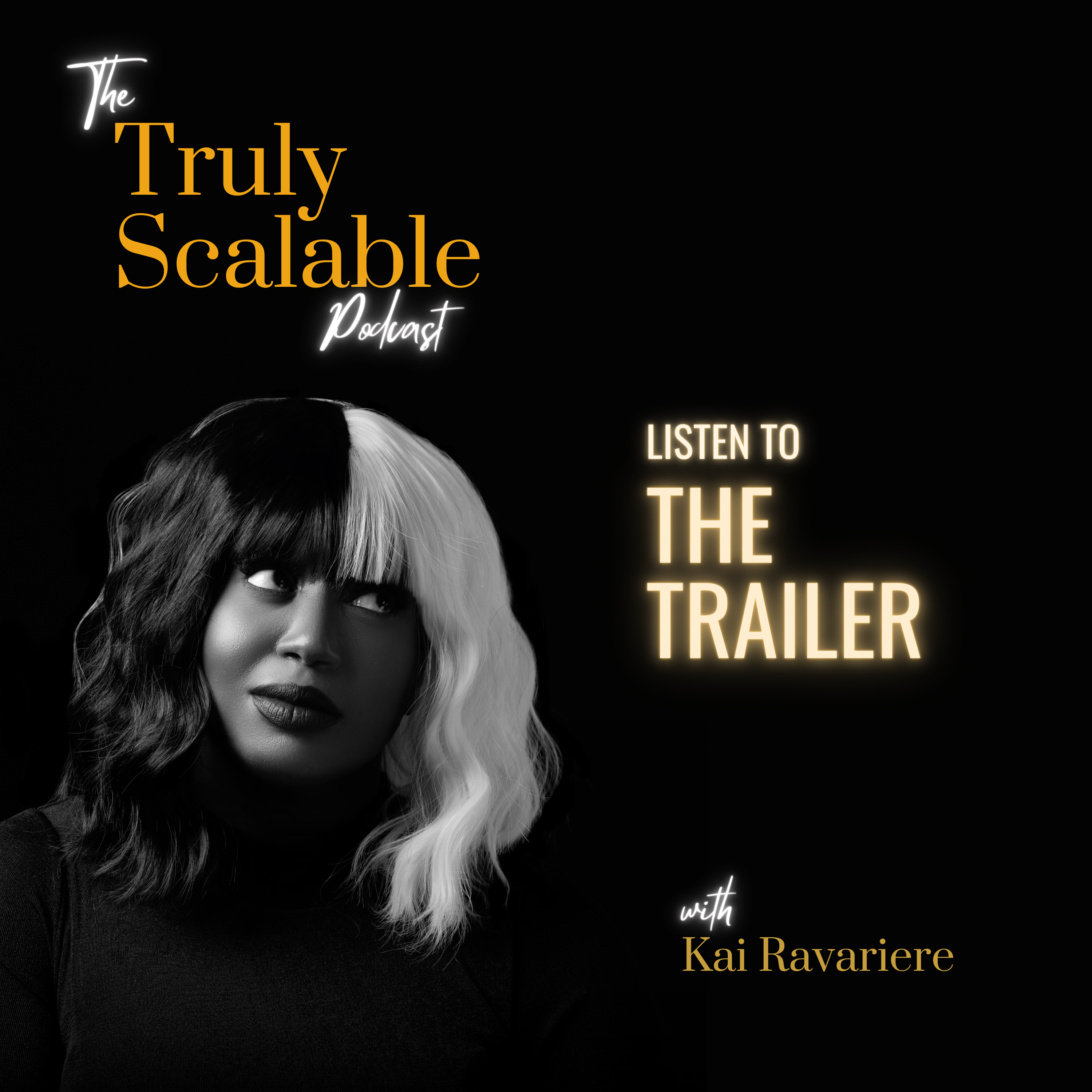Episode Transcript
[00:00:01] This is the truly scalable podcast, the inner mind of a paid media executive empowering ecommerce brands to optimize and strengthen the backbones of their brands, companies, teams and themselves to ensure a fast, highly profitable scaling, growth and success. However you define it, victories, failures, scandals, cautionary tales lessons on growth scaling frameworks revelations in marketing and advertising... join me as I break down frameworks, dispel myths and shift paradigms for e commerce brand founders and CMOs to strengthen the makeup of their businesses and layer smart strategies for maximum profitability at scale. I'm Kai Ravariere and I'm here to help you become Truly Scalable.
[00:00:56] Hey again, welcome back to another episode of Truly Scalable. On this podcast, I promised to give you the gift I never got: real, raw, unfettered insights, rooted in nearly a decade of experience, $168 million in ads data, and nearly $1.6 billion in revenue generated to date, from the hearts and minds of myself and my world-class team of scaling architects, wordsmiths, growth strategists, creatives, and consultants across every facet of eCommerce you can think of. That means that here you’ll get insights into what’s gone right lately, what’s gone wrong, brands that are killing it, brands that aren’t, what we’ve observed in the world of eCommerce, and lessons I’m learning as a growth architect, entrepreneur, media buyer, and human being on my own journey to $10 billion in impact.
The previous episode I’d kept pretty tame by design, where I got into what went right last week and some smart approaches a super savvy brand had taken to scale 10x and catapult to $750 million in revenue. By the way, if you’d like to listen to a bonus episode that dives deeper into the Stanley cup craze and the marketing and psychological mechanics behind it, subscribe to The GrowthGeek, our weekly newsletter at www.trulyscalable.com/subscribe to get access when it drops.
This time around, to make sure I keep my promise of full transparency, we’re going to go in a slightly different direction. I’m gonna tell you a little story.
Let’s get into:
How one of our clients needlessly lost $7 million in a single year.
[00:02:21] So we once took on an eight figure beauty brand whose sales seemed to come predominantly from retail partnerships as of late, and wanted to expand into a new distribution channel. Ecom sales had declined by 7 million from the year prior, and the founder and teams chalked it up to a post pandemic market correction, which didn't feel right to us, didn't smell right, you know. But true to form, we rolled up our sleeves and got to work to write the ship. Aligned with our truly scalable framework, we worked at optimizing for what are generally the most predictable, least volatile buyer and channel categories first. In this case, that meant we started with the leagues and leagues of customers we'd already purchased from the brand in the past, who required relationship building and additional nurturing to get them into subscriptions via retention marketing and retargeting via paid traffic. The first focus was to get the brand some of that delectable juicy MRR or monthly recurring revenue. But for the first time in KRA history since developing the truly scalable framework, after weeks of working our magic and layering proven approaches that have worked for countless others, these customers were not biting. They would not pull the purchase trigger at the levels needed to consider this part of the funnel optimized, not at a level that would exceed the power threshold. Now, I'll get into this a lot more in other episodes, but the power threshold is a quantifiable term I've coined that refers to the quality of execution required on any particular project, asset or initiative, in order for a team or a brand to actually see results down the funnel that are going to drive progress and improve a brand's marketing economics. It stands on the premise that not all execution is effective execution, and there are tons of ways a founder, marketer, team, agency or brand can muck up the execution such that the strategy, albeit an effective and proven one, won't bear fruit. And in this case, we thought the execution wasn't executing. Their conversion rate was abysmal, was like a poultry 1.2%, which was, if you can believe it, a market improvement from what it had been before, yet totally unacceptable given the proud of the brand, the price point of the product line, and the nature of the product. And we could not for the life of us figure out why their conversion rate was still this low. We tested an array of audiences. We rolled out an incredible array of strong, creative that yielded sky high click throughs out of the gate, but bore very little fruit when it came to sales. We brought in some of the best crow experts in the industry. Yet no matter how much onsite conversion optimization we ran, no matter what bells and whistles we threw at this thing, the conversion rate would not really budge among warm audiences in particular, we were just about to roll out a series of focus groups and studies to help put our finger on just what the hell was going on when the founder, who by her own admission, was flying by the seat of her pants and really didn't have the strong command of what she called, quote unquote, this ecommerce stuff, she casually mentioned something in passing that had instantly turned my blood to ice. As it turns out, this popular cult brand rather conveniently failed to mention that the year before they had a Black Friday sale that imploded their fulfillment and operations. They'd sold inventory that they didn't have, under the assumption that they'd simply be able to fulfill at a faster pace, yet never stress test their operations until they pulled in 10 million in sales on a single weekend. But as I always say, everything that could possibly go wrong during the holiday season will and what they called unforeseen circumstances reared their ugly heads in a way that completely jammed up their fulfillment capabilities. So, to make a long story short, their CMO, their operations director, and their largest manufacturer overseas dropped the ball. And there was no way in hell they were going to be able to get out enough product fast enough to serve the hundreds of thousands of customers they sold to that weekend. And instead of communicating with customers and issuing refunds, they simply fell silent.
[00:06:21] Founders, it took this brand six months to send products out to customers, and in that entire time, they made zero proactive moves to communicate and manage expectations and do any level of damage control. As a result, their loyal fanbase was no longer loyal. In fact, they lost a ton of trust in the brand. They dragged the company to filth all over social media over the course of months, and the brand was still reeling from the consequences over a year later.
[00:06:50] Probably something they should have mentioned, right?
[00:06:53] In any case, our surveys confirmed this chilling realization. A good chunk of this company's rather extensive audiences indicated they were not likely to buy from the brand again, and the company had a great deal of damage control and apology tours to do before they could start to see their economic shift in the right direction. What's worse, little known to us, their social media team was deleting negative comments on posts and ads at the founder's behest, and none of their other marketing partners had ever been notified of this, us included.
[00:07:24] Yes, maybe they should have been more forthright about the realities of the state of their business in this regard. But I'm all for personal responsibility, and I can confidently say that I messed up here too. If I'm honest. Looking back, I can say that we shouldn't have taken them on to begin with. This wasn't a deal I should have approved timely fulfillment at that time hadn't been among our extensive list of qualifications that we used to determine whether a brand should be eligible to work with us. And one could absolutely make the argument that it should have been. Now, in fairness, our eligibility criteria is already extremely long, so long, in fact, that it was taking forever to vet brands. And so we developed a tool that helps us determine a brand's eligibility. That way, the vetting process could be cut down from weeks to a matter of hours without sacrificing insights we need to make those decisions. The diagnostic is really a win win for both of us and the brand, because this isn't actually its primary objective. It was actually designed to help companies determine if they're really ready to open the floodgates of paid traffic based on the current state of their business and its existing scaling architecture and data. But in any event, the amount of time it takes a brand to ship products out, on average, was not a statistic we'd built into the tool or our analysis. And it should have been. It really, really should have been. Now, while it is true that the vast majority of agencies serving emerging and challenger brands can probably count the number of criteria they have for whether they'll take a client on on half of a single hand, still to this day I sort of kick myself for not having seen this calamity coming, even though we do have a greater degree of discernment than most in our dedication to only onboarding brands who will actually benefit from high yield paid traffic. I don't know, guys. I usually have a pretty good spidey sense about these things, but because they were already at eight figures, I made the grave error of assuming they were like every other eight figure brand we'd worked with and assumed their fulfillment systems had properly supported the levels of sales they'd been doing in the past. Assuming really does make an ass out of you and me, doesn't it?
[00:09:28] Since then, we've revamped our criteria to make sure rare occurrences like this don't fall through the cracks and blow up our growth plans for the brand. It doesn't disqualify a brand on its own, but it does require us to be fully transparent and set realistic expectations about the work and time required to regaining customer trust and refurbishing the brand's reputation. It's just responsible expectation management is all. In any case, we parted ways from this company about three months later, after we had to place them on probation. It turns out that fulfillment wasn't the only area where they were failing, and there were a myriad of team bottlenecks and problems within the company that were above our reach. But I'm grateful for the experience because there are so many lessons to be learned here. The best takeaway for you? Make sure your ship is tightly run before you strive for the next rung on the revenue ladder. Listen, I know it's all too easy to reach virality and get swept away in all the orders and sales, but it's incredibly important. As I always say, you want measured, efficient growth, not catastrophic growth. And if your operations is unable to keep up with the pace of your marketing, any growth can become catastrophic. I can't tell you how many brands have imploded because they, like Icarus, flew too close to the sun and exploded their revenue before they were actually ready. A huge part of that is making sure your operations and fulfillment teams are actually in communication with whoever your head of marketing is to send along inventory reports and to help marketing teams gauge just how hard they can go when it comes to scaling campaigns.
[00:11:01] Now let's get into what I read this week. Get settled in, folks, because this tea is piping hot. Do you remember Black Wolf, the SaaS company that was chomping at the bit to take Uber and Lyft market share by providing consumers with safer rideshare options? For those who aren't familiar, Black Wolf is the brainchild of Carrie King Brown, an Atlanta, Georgia resident who went viral on social media over the summer and broke through into cable news networks for his app and service, one which claims to provide armed drivers who can protect riders and provide security and safety from the world, much like an armed guard. For the low, low cost of $65 plus, 175 riders can ride in the lap of luxury in a fleet of luxury bulletproof vehicles driven by licensed, certified, former law enforcement and former military personnel dedicated to getting them from point a to point b safely. An awesome idea, to be sure, especially as rider results have increased with rideshare companies like Uber and Lyft. But here's the thing, fam, you kind of need to validate the concept and the viability of the business model before you start transacting, especially in a regulated industry. And I'm not talking about the rideshare industry here. I'm talking about the security and protection industry. Each state requires companies to be licensed. Georgia is no exception, and Black Wolf isn't.
[00:12:27] Several weeks ago, Fox five Atlanta reported that upon investigation, Black Wolf not only doesn't have a security company license that allows the company to legally provide this service, they've never had one according to news reports, licensure requirements include proof of state approved employee training, meeting certain insurance levels, and the owner of the company must pass the state exam.
[00:12:51] Well, chow, according to the state, Carrie has failed this exam six times, yet as of the time of the production of this episode, was still illegally running his service to Atlanta writers. The state's assistant attorney general asserts that Carrie and the company are putting the public at risk, and I'm inclined to agree. Yet Carrie King Brown kept moving like the company was legitimate despite being slapped with a cease and desist in June. Before he went viral, Fox interviewed Karrion June, during which he stated he didn't need this type of license because Black Wolf was a rideshare company and not a security company. Somehow, despite all social media content, heavily leaning on the security company angle and boasting that all their drivers came armed, something both Uber and Lyft have prohibited from their drivers. Anywho, the state of Georgia must not have agreed because shortly after that interview, the state revoked his individual security protection license for, well, obvious reasons. Because if he's running this thing illegally, how could Black Wolf possibly be trusted to protect writers, right? I suppose they figured that would stop the company in its tracks or at least jolt the founder with a wake up call. But it gets even better, fam the Fox Five team caught him serving as part of Marjorie Taylor Greene's security detail not two months after his license was revoked. And in true messy form that only a reporter can pull off, Fox Five reached out to her and asked whether she was aware one of her executive protection agents was not licensed in Georgia. She didn't respond to requests for comment, which isn't surprising. But neither did Carrie when they reached out to him too. And get this, in the hearing that ensued due to Black Wolf's actions, Carrie King Brown didn't even show up. And of course, the judge affirmed that there was, quote unquote, overwhelming evidence that Black Wolf was obviously a security company. And they slapped Black Wolf with a good ol'cease and desist. But wait, there's more. Black Wolf never stopped the rideshare security service to the Atlanta metro area. When Fox Five tried to use the app to hill ride from an armed executive protection driver, one showed up at the ready for some illegal protection within 15 minutes. According to Fox Five, he had no knowledge of any court order or cease and desist. I mean, hey, at least he was prompt. To this day, Carrie King Brown is still actively marketing his company, has taken no steps to publicly address the misdeeds of Black Wolf and has communicated plans to, quote unquote, expand new cities.
[00:15:22] What really kills me about this is that Kerry knew good and damn well that the company needed to be licensed as a security company in the state of Georgia in order to transact business of this nature. We know that to be true because the man took and failed the state exam for the license six times, the most recent being March 2023, just weeks before he began going viral on social media and doing national cable news interviews on behalf of the company. Now he's being slapped with $500 a day fines for every day he's in operation, according to Foxside Atlanta. So this begs the question, what the hell is this guy thinking? Listen, founders, just because your product is SaaS and you're selling online doesn't mean you aren't subject to regulations. It doesn't mean you won't be held accountable by your state and local laws. And it sure as hell doesn't mean you can go around with bogus marketing claims as though your armed security protection is on the up and up. They can't be licensed to do this work for Black Wolf if the company is not licensed to do this work, because every security agent must be licensed under the company by which they're employed.
[00:16:24] This is just another example of a brand marketing well above the realities of their capabilities. And in this case, it could potentially give people a false sense of security, quite literally. Whether it's your audiences and consumers who take you down or the government itself, failing to adequately and lawfully serve your customers will only end in shambles. Now, I have no idea if Black Wolf has investors, but if I'm them, I'm livid. I mean, the idea is fantastic, and they do seem to have strong reviews in the Apple App Store, so perhaps the service is meeting expectations for now, but failing to secure something so absolutely fundamental to operations is going to raise a brow for any prospective, discerning customer, let alone a prospective investor. And I imagine Black Wolf, just like Uber did, will probably need funding for expansion into new territories at some point. Even if Black Wolf makes a shift to lean heavier on the rideshare component of their service and attempts to downplay the security protection aspect in the future, they're going to have to do a lot of work to convince regulators that a security company license isn't required when the very marketing angle that afforded them notoriety, virality and all this very high profile press was based on the novel notion of providing security protection in the ridesharing industry, and they'll need to put in some real work if they're going to regain the trust of the public too. A hard lesson to learn the hard way to be sure, at the end of the day, your ability to serve your customers properly and maintain a high standard of excellence and trust will make or break your brand. To put it diplomatically, it'll be interesting to see how the brand moves in the future.
[00:18:03] This has been the truly scalable podcast, the inner mind of a paid media executive empowering ecommerce brands to optimize and strengthen the backbones of their brands, companies and teams to ensure fast, highly profitable scaling and growth in any climate.
[00:18:18] Thanks for listening today. If this has been insightful, entertaining or interesting, subscribe and leave a review. They really do help drop some insight into topics you'd like to hear me get into too. I read all suggestions and we'll incorporate them into future episodes. Are you yearning to find better, smarter ways to scale and grow? Does the growing competition in this industry and the ever changing facets of digital advertising have you experiencing stagnant growth, declining revenue, or lack of profitability? Do you feel like you must be missing key pieces to the puzzle that would help you get to where you know your brand could and should be? Has your growth journey felt stressful, tedious, or underwhelming lately?
[00:18:54] Sounds like you could use a growth geek, our free weekly email newsletter that's packed with lessons, insights, perspectives on entrepreneurship, scaling, leadership and all things marketing and advertising for ecommerce. Sign up for free at Ww dot trulyscalable.com subscribe thanks again for joining me on this episode of Truly Scalable.





